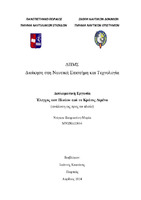Έλεγχος των πλοίων από το κράτος λιμένα

View/
Keywords
Port state controlAbstract
This thesis aims at the broader study of the role of port state inspection, the so-called Port State Control, in global shipping and the contribution to the reduction of cases of non-compliance of ships and deviations from established standards in accordance with the regulations and conventions of the international community and the IMO. In order to analyze comprehensibly and meticulously the functions of the PSC, an introduction is first made to the causes that established port state control through the regional agreements of the states and a reference to the main IMO Conventions on which the structure and organization of PSC procedures was based.
Reference is also made to the definitions of port State, flag State and types of registry, which then present the link between them regarding ship inspections. It also analyzes the types of PSC inspections, the periodicity and cases in which each type of inspection is carried out, as well as the factors that affect its conduct. In the context of inspections in order to give an appropriate priority for inspection to ships, each ship is assigned a risk rating in relation to compliance with regulations which depends on several elements, the main ones being the performance of its managing company as well as the performance of the ship in previous inspections.
From carrying out inspections, a ship can show high performance or very low resulting in adverse consequences up to even keeping the ship in port to restoring critical points where deviations in the control of the authorities occurred. In this thesis, reference is made to the ISM Code and the Certificates that must be kept, as well as cases of deficiencies that may lead to the detention of the ship.
In particular, for the Paris Memorandum of Understanding, the deficiency codes of ships and the action taken measures for each deficiency are presented, which are determined in the audit by the control officer (PSCO). Port State Control addresses several points where emphasis is placed on the living conditions of personnel but also on safety issues and prevention of pollution from ships.

